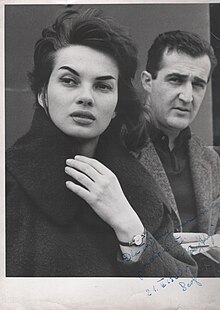Veljko Bulajić
| Veljko Bulajić | |
|---|---|

Bulajić with Ewa Krzyżewska in 1960.
|
|
| Born |
22 March 1928 Vilusi, Kingdom of Yugoslavia |
| Residence | Zagreb, Croatia |
| Education | Centro Sperimentale di Cinematografia |
| Occupation | Film director |
| Years active | 1953–present |
| Notable work | Vlak bez voznog reda, Kozara, Bitka na Neretvi, Veliki transport |
| Spouse(s) | Vlasta Bulajić |
Veljko Bulajić (born 22 March 1928) is a Croatian Montenegrin film director. He has spent the majority of his life working in Croatia and is primarily known for directing the Yugoslav state-sponsored World War II-themed movies from the Partisan film genre. Bulajić was a soldier in World War II having joined the Yugoslav Partisans resistance group at the age of 13. Bulajic and his two older brothers were all wounded in battle. His oldest brother, Đorđe, succumbed to his injuries. The two surviving brothers, Veljko and Stevan, would later co-write the movies Kozara and Battle of Neretva. According to the Croatian Public Broadcasting Company, his films have reached an audience in excess of 500 million viewers worldwide.
Bulajić was born in the village of Vilusi near Nikšić, Kingdom of Serbs, Croats and Slovenes. His debut film Train Without a Timetable was a complex drama dealing with the interactions among people who were forcefully leaving their ancestral homes in order to move to new, yet undeveloped farmland. The film was nominated for the Palme d'or at the Cannes Film Festival.
In 1962 his film Kozara brought him international attention and was awarded the Big Golden Arena for Best Film at the Yugoslav National Film Awards. The film had the honor and privilege of premiering in the world's largest museum, the French Louvre It was entered into the 3rd Moscow International Film Festival where it won the Golden Prize. Bulajic was a member of the jury at the 4th Moscow International Film Festival.
...
Wikipedia
